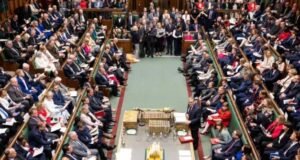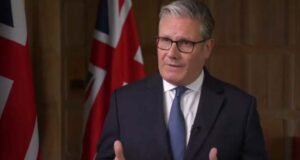
The UK government has been involved in a lot of shuttle diplomacy with the EU since Labour won the UK election
Early in 2025, Prime Minister Sir Keir Starmer has been invited to an informal summit of EU leaders. It’s the first such invitation for the UK since the bitter days of the Brexit negotiations.
The focus of the February meeting is future security and defence co-operation. The backdrop: the volatile state of the world from Europe’s perspective.
Wars rage in the Middle East and in Europe – with Russia aided in its assault on Ukraine by Iran, North Korea and China.
Adding to the uncertainty haunting this continent, Donald Trump is poised to re-enter the White House.
He threatens Western cohesion with his pledge to slap punitive tariffs on imports – a big worry to the EU and the UK – and to potentially walk away from Nato, the transatlantic defence alliance Europeans have relied on for security, since its founding after World War Two.
Threats a reminder of shared values
These threats to security and to trade revenues have helped remind the EU and the UK of the common values they share in unpredictable times.
The EU felt weakened by Brexit in 2016. It meant losing a big economy and its only significant military power apart from France.
As for post-Brexit UK, now free from the rules of EU membership, it’s also now a far smaller power on the world stage.
And, closer to home, the Labour government has realised Europe is key to delivering on a number of priority pledges to the UK public.
“The economy, defence, migration… there’s a European element to all of this, making EU relations important for the whole government agenda. Things which will make a success of this government are tied up with Europe,” says Mark Leonard, the director of the European Council on Foreign Relations.
Labour has repeatedly promised an “ambitious reset” of EU-UK relations.
There has been lots of shuttle diplomacy and symbolism since it won the general election in the summer.
Foreign Secretary David Lammy attended a meeting of EU Foreign Ministers, Chancellor Rachel Reeves gave a speech at a summit of EU finance ministers, and the prime minister popped over to Brussels for a sit-down with EU Commission Chief Ursula von der Leyen.
Goodwill in Brussels but scepticism too
But what does this “reset” really mean? What can we expect in 2025?
Might the UK government allow some freedom of movement in exchange for economic benefits on EU trade?
An EU-UK summit is planned for spring, and a number of political figures and high-level diplomats from EU member states and the UK spoke to me on condition of anonymity ahead of bilateral negotiations getting started.
I kept hearing of the “enormous amount of goodwill” in the EU towards the new Labour government with its oft-repeated “reset” enthusiasm.
At the same time though, there is a clear note of Brussels scepticism the Labour government would do well to take heed of, if it wants to see tangible results.
“The headspace is there. The appetite is there in Europe for closer UK relations,” one EU figure told me.
“What’s less clear is what London is really interested in – and what trade-offs it’s willing to make to get there. That’s key and that appears not to have been bottomed out in London yet.”
 Weekly Bangla Mirror | Bangla Mirror, Bangladeshi news in UK, bangla mirror news
Weekly Bangla Mirror | Bangla Mirror, Bangladeshi news in UK, bangla mirror news







